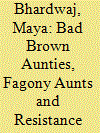|
|
|
Sort Order |
|
|
|
Items / Page
|
|
|
|
|
|
|
| Srl | Item |
| 1 |
ID:
191705


|
|
|
|
|
| Summary/Abstract |
This article offers an urgent complement to the trope of the South Asian aunty as an agent of discipline, shame, heteropatriarchy and tradition by exploring the counter-archetype of the resistance aunty—the radical feminist aunty who holds down social movements—in the South Asian diaspora. This article centres a queer lens on transgressive and activist aunties, and analyses digital and in-person queerings of the aunty in contemporary social and cultural movements. Examining resistance aunties in the writing, performances, interviews and other digital and in-person cultural work of four queer South Asians in the US and the UK, this article asserts the aunty as a core agent of resistance. It develops the notion of the resistance aunty in conversation with activist aunting in Black American organising and scholarship, and locates the legacy of the resistance aunty in queer and trans movements in the Global South and in the diaspora. By applying a new theoretics of resistance auntyhood to studies of aunty labour, this article argues for the importance of queer activist aunties in nurturing and propelling transformative social movements.
|
|
|
|
|
|
|
|
|
|
|
|
|
|
|
|
| 2 |
ID:
191707


|
|
|
|
|
| Summary/Abstract |
This article examines To T, or Not To T?, a solo play by D’Lo, a queer transmasculine Sri Lankan Tamil American performance artist and comedian. Considering the Super Aunty character, I examine how aunties orient diasporic life towards multiple modes of belonging and exclusion. Specifically, I explore how Aunty Discipline directed toward the queer diasporic child is vital in creating future hetero-reproductive diasporic subjects, then consider the intimacies of fictive kinship through the term ‘fam’. The queer diasporic body is a text on which others enact diasporic meanings, but D’Lo uses that very queer body to actively reimagine and re-image family and community, thereby infusing these spaces with his own queer ontologies and epistemologies.
|
|
|
|
|
|
|
|
|
|
|
|
|
|
|
|
| 3 |
ID:
191709


|
|
|
|
|
| Summary/Abstract |
Since the 1970s, a network of Sindhi housewives in Singapore has met monthly to feast and socialise. At every meeting, each member pools in cash to form the ‘kitty’—the prized sum won by a lucky recipient of the draw. The size of the contribution is a measure of the group’s exclusivity. Indeed, these are affluent women who seem to have no apparent need for the money. Rather, they indulge in incessant bickering over car-pooling, consumption practices and about how to break down the lunch bill. Though members are regularly absent, exiting the group is a rarity. But why stay, and why have a kitty? This essay probes into the social value of the kitty group, identifying it as a critical space for the women’s independence beyond the household where they actively engage in status production. Their participation secures their identities as upper-class Sindhi women, as ‘housewives’ and as ‘aunties’.
|
|
|
|
|
|
|
|
|
|
|
|
|
|
|
|
|
|
|
|
|